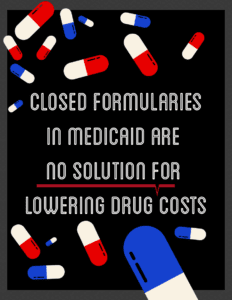 For people living at or near the federal poverty line, Medicaid coverage can literally mean the difference between living a long, healthy, and productive life; or suffering with an untreated, painful, and potentially deadly medical condition. Consider Vickie Goldstein, a Florida Medicaid beneficiary who was diagnosed with hepatitis C—a serious viral and communicable liver disease. For years, Vickie suffered debilitating symptoms and increasing damage to her liver. When expensive breakthrough drugs that can cure hepatitis C were approved by the FDA in late 2014, Vickie was one of the first to request help. But Florida Medicaid had placed onerous limitations on the drugs because they were so expensive. Eventually Vickie got legal help and convinced Florida to cover the drugs for her and thousands of other Florida Medicaid beneficiaries with hepatitis C. Vickie was cured of hepatitis C in 2016. If her state were allowed to exclude these drugs from coverage, Vickie might still be living with hepatitis C and facing liver failure, or worse.
For people living at or near the federal poverty line, Medicaid coverage can literally mean the difference between living a long, healthy, and productive life; or suffering with an untreated, painful, and potentially deadly medical condition. Consider Vickie Goldstein, a Florida Medicaid beneficiary who was diagnosed with hepatitis C—a serious viral and communicable liver disease. For years, Vickie suffered debilitating symptoms and increasing damage to her liver. When expensive breakthrough drugs that can cure hepatitis C were approved by the FDA in late 2014, Vickie was one of the first to request help. But Florida Medicaid had placed onerous limitations on the drugs because they were so expensive. Eventually Vickie got legal help and convinced Florida to cover the drugs for her and thousands of other Florida Medicaid beneficiaries with hepatitis C. Vickie was cured of hepatitis C in 2016. If her state were allowed to exclude these drugs from coverage, Vickie might still be living with hepatitis C and facing liver failure, or worse.
The high cost for new hepatitis C treatments prompted a Senate investigation and renewed the national debate on drug pricing and strategies to help bring costs down. Massachusetts recently proposed a “plan” to reduce spending on outpatient prescription drugs: cut access.
While the proposal has been lauded by some as a smart way to reduce spending on drugs, its supporters have glossed over the impact on low-income people who rely on Medicaid. Excluding drugs through a “closed formulary” means that some people will not get the medical treatment they need—and that burden is most likely to fall on those with serious, debilitating, and chronic medical conditions who need multiple drugs to treat their conditions. The closed formulary could leave those Medicaid beneficiaries without drug treatment vital to their well-being.
Federal law already provides state Medicaid programs with significant cost savings for outpatient prescription drugs. Pharmaceutical companies must provide hefty rebates to states, and in exchange, states cover most FDA-approved drugs. States can achieve additional savings by negotiating supplemental rebates and through utilization controls to steer beneficiaries toward preferred drugs and limit access to more expensive drugs. Thus while the original list price for hepatitis C drugs could be as high as $85,000 for a full treatment regimen, the actual price paid by Medicaid programs is by all accounts much lower (but still unknown due to confidentiality agreements between states and drug companies). Moreover, federal law already permits states to create closed formularies that exclude drugs that do not have a “significant, clinically meaningful therapeutic advantage” over drugs that are included in the formulary.
Massachusetts’ proposal would go further. Massachusetts posits that a closed formulary will allow it to negotiate additional discounts on top of the Medicaid rebates and supplement rebates achieved through preferred drugs lists. But if the state is unable to reach an agreement with a manufacturer, it could exclude drugs from its formulary even if they have a clinical advantage over less effective drugs on its formulary. That means that if the Massachusetts proposal were implemented, Medicaid beneficiaries will be denied effective drug therapies they need because the state could not reach financial agreement with the drug manufacturers.
There is little evidence though that Massachusetts’s proposal would result in much (if any) additional savings for the state. A recent Tufts study found that at least 20 percent of closed formularies actually resulted in increased costs. At the same time, there is ample evidence to suggest that a closed formulary would result in low-income people not getting medical treatment that they need. The same Tufts study found that patients in at least 25 percent of closed formularies experienced worse health outcomes.
There is no doubt that the high cost of prescription drugs is a real problem for state Medicaid programs, but is the savings to state budgets worth the price? In its proposal to limit prescription drug access, Massachusetts complains that Medicaid consumes 40 percent of the state budget. But that number encompasses both state and federal funding. In fact, the federal government pays for nearly 2/3rds the costs for Medicaid services in Massachusetts, including prescription drugs. For example, in 2017, Massachusetts projected that the additional $112.7 million it would spend to cover drugs for hepatitis C would be offset by $101.6 million in federal matching funds. If Massachusetts is looking to reduce spending on outpatient patient prescription drugs, there are other strategies it can pursue that can protect access for Medicaid enrollees.
But allowing states to try to lower their costs at the expense of low-income people on Medicaid does not address the real problem of drug pricing and cost. If Massachusetts is serious about addressing the cost of prescription drugs, we encourage the state to work with politicians to explore substantial and progressive reforms that lower the cost of drugs for everyone.
